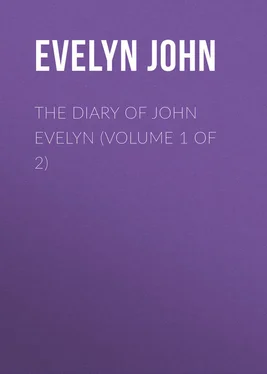John Evelyn - The Diary of John Evelyn (Volume 1 of 2)
Здесь есть возможность читать онлайн «John Evelyn - The Diary of John Evelyn (Volume 1 of 2)» — ознакомительный отрывок электронной книги совершенно бесплатно, а после прочтения отрывка купить полную версию. В некоторых случаях можно слушать аудио, скачать через торрент в формате fb2 и присутствует краткое содержание. Жанр: История, foreign_antique, foreign_prose, на английском языке. Описание произведения, (предисловие) а так же отзывы посетителей доступны на портале библиотеки ЛибКат.
- Название:The Diary of John Evelyn (Volume 1 of 2)
- Автор:
- Жанр:
- Год:неизвестен
- ISBN:нет данных
- Рейтинг книги:3 / 5. Голосов: 1
-
Избранное:Добавить в избранное
- Отзывы:
-
Ваша оценка:
- 60
- 1
- 2
- 3
- 4
- 5
The Diary of John Evelyn (Volume 1 of 2): краткое содержание, описание и аннотация
Предлагаем к чтению аннотацию, описание, краткое содержание или предисловие (зависит от того, что написал сам автор книги «The Diary of John Evelyn (Volume 1 of 2)»). Если вы не нашли необходимую информацию о книге — напишите в комментариях, мы постараемся отыскать её.
The Diary of John Evelyn (Volume 1 of 2) — читать онлайн ознакомительный отрывок
Ниже представлен текст книги, разбитый по страницам. Система сохранения места последней прочитанной страницы, позволяет с удобством читать онлайн бесплатно книгу «The Diary of John Evelyn (Volume 1 of 2)», без необходимости каждый раз заново искать на чём Вы остановились. Поставьте закладку, и сможете в любой момент перейти на страницу, на которой закончили чтение.
Интервал:
Закладка:
John Evelyn
The Diary of John Evelyn (Volume 1 of 2)
EVELYN'S DIARY
T hetwo chief diarists of the age of Charles the Second are, mutatis mutandis , not ill characterized by the remark of a wicked wit upon the brothers Austin. "John Austin," it was said, "served God and died poor: Charles Austin served the devil, and died rich. Both were clever fellows. Charles was much the cleverer of the two." Thus John Evelyn and Samuel Pepys, the former a perfect model of decorum, the latter a grievous example of indecorum, have respectively left us diaries, of which the indecorous is to the decorous as a zoölogical garden is to a museum: while the disparity between the testamentary bequests of the two Austins but imperfectly represents the reputation standing to Pepys's account with posterity in comparison with that accruing to his sedate and dignified contemporary.
Museums, nevertheless, have their uses, and Evelyn's comparatively jejune record has laid us under no small obligation. But for Pepys's amazing indiscretion and garrulity, qualities of which one cannot have too little in life, or too much in the record of it, Evelyn would have been esteemed the first diarist of his age. Unable for want of these qualifications to draw any adequate picture of the stirring life around him, he has executed at least one portrait admirably, his own. The likeness is, moreover, valuable, as there is every reason to suppose it typical, and representative of a very important class of society, the well-bred and well-conducted section of the untitled aristocracy of England. We may well believe that these men were not only the salt but the substance of their order. There was an ill-bred section exclusively devoted to festivity and sport. There was an ill-conducted section, plunged into the dissipations of court life. But the majority were men like Evelyn: not, perhaps, equally refined by culture and travel, or equally interested in literary research and scientific experiment, but well informed and polite; no strangers to the Court, yet hardly to be called courtiers, and preferring country to town; loyal to Church and King but not fanatical or rancorous; as yet but slightly imbued with the principles of civil and religious liberty, yet adverse to carry the dogma of divine right further than the right of succession; fortunate in having survived all ideas of serfdom or vassalage, and in having few private interests not fairly reconcilable with the general good. Evelyn was made to be the spokesman of such a class, and, meaning to speak only for himself, he delivers its mind concerning the Commonwealth and the Restoration, the conduct of the later Stuart Kings and the Revolution.
Evelyn's Diary practically begins where many think he had no business to be diarising, beyond the seas. The position of a loyalist who solaces himself in Italy while his King is fighting for his crown certainly requires explanation: it may be sufficient apology for Evelyn that without the family estates he could be of no great service to the King, and that these, lying near London, were actually in the grasp of the Parliament. He was also but one of a large family and it was doubtless convenient that one member should be out of harm's way. His three years' absence (1643-6) has certainly proved advantageous to posterity. Evelyn is, indeed, a mere sight-seer, but this renders his tour a precise record of the objects which the sight-seer of the seventeenth century was expected to note, and a mirror not only of the taste but of the feeling of the time. There is no cult of anything, but there is curiosity about everything; there is no perception of the sentiment of a landscape, but real enjoyment of the landscape itself; antiquity is not unappreciated, but modern works impart more real pleasure. Of the philosophical reflections which afterward rose to the mind of Gibbon there is hardly a vestige, and of course Evelyn is at an immeasurable distance from Byron and De Staël. But he gives us exactly what we want, the actual attitude of a cultivated young Englishman in presence of classic and renaissance art with its background of Southern nature. We may register without undue self-complacency a great development of the modern world in the æsthetical region of the intellect, which implies many other kinds of progress. It is interesting to compare with Evelyn's narrative the chapters recording the visit to Italy supposed to have been made at this very period by John Inglesant, who inevitably sees with the eyes of the nineteenth century. Evelyn's casual remarks on foreign manners and institutions display good sense, without extraordinary insight; in description he is frequently observant and graphic, as in his account of the galley slaves, and of Venetian female costumes. He naturally regards Alpine scenery as "melancholy and troublesome."
Returned to England, Evelyn strictly follows the line of the average English country gentleman, execrating the execution of Charles I., disgusted beyond measure with the suppression of the Church of England service, but submissive to the powers that be until there are evident indications of a change, which he promotes in anything but a Quixotic spirit. Although he is sincerely attached to the monarchy, the condition of the Church is evidently a matter of greater concern to him: Cromwell would have done much to reconcile the royalists to his government, had it been possible for him to have restored the liturgy and episcopacy. The same lesson is to be derived from his demeanor during the reigns of Charles and James. The exultation with which the Restoration is at first hailed soon evaporates. The scandals of the Court are an offense, notwithstanding Evelyn's personal attachment to the King. But the chief point is not vice or favoritism or mismanagement, but alliances with Roman Catholic powers against Protestant nations. Evelyn is enraged to see Charles missing the part so clearly pointed out to him by Providence as the protector of the Protestant religion all over Europe. The conversion of the Duke of York is a fearful blow, James's ecclesiastical policy after his accession adds to Evelyn's discontent day by day, while political tyranny passes almost without remark. At last the old cavalier is glad to welcome the Prince of Orange as deliverer, and though he has no enthusiasm for William in his character as King, he remains his dutiful subject. Just because Evelyn was by no means an extraordinary person, he represents the plain straightforward sense of the English gentry. The questions of the seventeenth century were far more religious than political. The synthesis "Church and King" expressed the dearest convictions of the great majority of English country families, but when the two became incompatible they left no doubt which held the first place in their hearts. They acted instinctively on the principle of the Persian lady who preferred her brother to her husband. It was not impossible to find a new King, but there was no alternative to the English Church.
Evelyn's memoirs thus possess a value far exceeding the modest measure of worth allowed them by De Quincey: "They are useful as now and then enabling one to fix the date of a particular event, but for little besides." The Diary's direct contribution to historical accuracy is insignificant; it is an index, not to chronological minutiæ, but to the general progress of moral and political improvement. The editor of 1857 certainly goes too far in asserting that "All that might have been excluded from the range of his opinions, his feelings and sympathies embraced"; but it is interesting to observe the gradual widening of Evelyn's sympathies with good men of all parties, and to find him in his latter days criticising the evidence produced in support of the Popish Plot on the one hand, and deploring the just condemnation of Algernon Sydney on the other. It is true that, so far as the sufferings of his country are concerned, his attitude is rather that of the Levite than of the Samaritan; but more lively popular sympathies would have destroyed the peculiar value attaching to the testimony of the reluctant witness. We should, for example, have thought little of such a passage as the following from the pen of Burnet, from Evelyn it is significant indeed: —
Читать дальшеИнтервал:
Закладка:
Похожие книги на «The Diary of John Evelyn (Volume 1 of 2)»
Представляем Вашему вниманию похожие книги на «The Diary of John Evelyn (Volume 1 of 2)» списком для выбора. Мы отобрали схожую по названию и смыслу литературу в надежде предоставить читателям больше вариантов отыскать новые, интересные, ещё непрочитанные произведения.
Обсуждение, отзывы о книге «The Diary of John Evelyn (Volume 1 of 2)» и просто собственные мнения читателей. Оставьте ваши комментарии, напишите, что Вы думаете о произведении, его смысле или главных героях. Укажите что конкретно понравилось, а что нет, и почему Вы так считаете.












